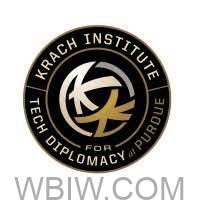
WASHINGTON – The Krach Institute for Tech Diplomacy at Purdue, the preeminent authority for advancing freedom by integrating technological innovation with statecraft, is celebrating the one-year anniversary of its founding.
Under the leadership of Purdue University President-elect Dr. Mung Chiang, Director Bonnie Glick, and Advisory Board Chairman Keith Krach, the Institute leverages the expertise of Purdue University and diplomatic leaders to bridge the knowledge and experience gaps between innovators and policymakers on critical and emerging technologies vital to U.S. foreign policy and national security interests.
Throughout the last year, the Krach Institute for Tech Diplomacy at Purdue added more than 20 distinguished experts to its diverse and fast-growing team of fellows, expanding its subject matter expertise on tech issues shaping 21st century diplomacy, including 5G/6G, artificial intelligence, energy and climate, hypersonics, rare earth elements, semiconductors, quantum computing, synthetic biology, agricultural technologies, digital currencies, supply chains, and advanced manufacturing.
In partnership with Purdue University, the Institute’s expert cohort developed and deployed workshops and training programs for policymakers focused on emerging tech sectors including hypersonics, artificial intelligence, and global semiconductor supply chains.
The Institute has facilitated international gatherings and thought-provoking discussions, including the inaugural Bilateral Tech Diplomacy Series with the U.S. and Australian academic, industry, and diplomatic leaders on aerospace technologies, misinformation, and disinformation. At its first Tech Freedom Awards held last month, the Krach Institute for Tech Diplomacy at Purdue recognized the Honorable Daniel S. Goldin, the longest-tenured NASA Administrator, and mobile network operator and infrastructure company Africell, for their work advancing freedom through trusted technologies.

“The Krach Institute for Tech Diplomacy at Purdue was founded because there is a bipartisan and growing appreciation for the inextricable links between technological advancements and global statecraft,” said Institute Director Bonnie Glick. “The Institute is proud to be a global convener dedicated to ensuring leaders of the United States and like-minded nations understand critical and emerging technologies and make informed laws and policy decisions that advance democracy and human rights.”



